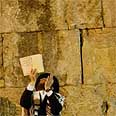
Survey: Jerusalem enjoys economic boost, happiest residents
Israel's capital, increasingly defined by its religious majority, is apparently in rude health, with new jobs, positive migration; city nevertheless still failing to entice young, secular students to remain
The data, made public before the 46th Jerusalem Day, found the city enjoying a positive economic momentum. The year 2012 saw some 17,000 new jobs created in the capital, in addition to approximately 30,000 jobs created between 2009 and 2007, meaning that in the course of the last four years Jerusalemites were offered some 50,000 new working positions.
Related stories:
- Jerusalem Day: Youngsters discuss hardships, advantages
- Op-ed: A lesson on Jerusalem
- Op-ed: Jews belong in Jerusalem
Another clause simply shows Jerusalemites to be pleased with the city of their dwelling – more so than their compatriots living in other Israeli urban centers. An impressive 88% of Jerusalemites said they were happy with their city, 2% higher than Tel Avivians, 4% higher than in Haifa and 6% higher than in Ashdod.
Fifty-nine percent of Jerusalem's residents said they were happy with their economic condition, while the average in other cities stands at 55%. Additionally, an increasing amount of residents said they were happy with the cleanness in the city, and the number of parks and green areas Jerusalem has to offer.
Jerusalem is the largest urban center in Israel, both in terms of geography and in terms of number of residents. It is home to some 800,000 people, some 500,000 of whom are Jews.
The majority of the Jews in the city define themselves as religious to varying degrees. Some 32% defined themselves as haredi (compared to an average 8% in other big Israeli cities), 21% as religious, 26% as traditional and 19% as secular.
In addition to all the other positives, Jerusalem's net migration rate shows a positive value, meaning more people enter the city than leave it; the new trend is a welcome departure from the norm for a city that has been plagued by negative migration.
According to the statistics bureau, it is most likely accounted for by the growing popularity of the capital among haredi and religious youths.
Young, secular, educated leave capital
Despite the good news, the ongoing tension surrounding security issues, the haredization of the city and its relatively slow rhythm of life are pushing students, studying in one of the city's many academic institutes, to leave Jerusalem shortly after graduation.
The massive efforts of the municipality, as well as a number of dedicated NGOs, to keep students in the city and balance its demographic shift seem to be in vain – the movement of the young, secular and educated seems to be one directional, out of the city.
According to CBS data, during the last year some 37,000 students studied in the capital, but only 12,300 chose to call it their home.
"Young people come here to study, but they mostly choose not to stay," said Elisheva Mazya, the chief executive officer for New Spirit, an NGO dedicated to keeping young people in the capital.
"In the 70s, young people would come to Jerusalem to study and would remain to live in the city afterwards." However, she explains that 20 years later "this trend was reversed because of terror attacks and haredization."
Despite the fact that current data suggest a slight decrease in migration from the city in the 24-30 age group, many complain that expense of living is also a factor for abandoning the capital.
"Cost of living in Jerusalem is almost as expensive as Tel Aviv, both in terms of rent and in terms of groceries," Motti, a 27-year-old law student said, adding that "law firms in Jerusalem pay NIS 1,000 ($280) less than firms in Tel Aviv do, which is a significant gap"
Gad Lior contributed to this report










